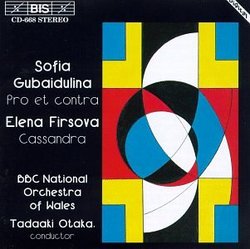| All Artists: Gubaidulina, Firsova, Otaka, Nat'l Orch of Wale Title: Pro Et Contra for Large Orchestra Members Wishing: 1 Total Copies: 0 Label: Bis Release Date: 10/14/1994 Album Type: Import Genre: Classical Styles: Historical Periods, Modern, 20th, & 21st Century, Symphonies Number of Discs: 1 SwapaCD Credits: 1 UPC: 789368014125 |
Search - Gubaidulina, Firsova, Otaka :: Pro Et Contra for Large Orchestra
 | Gubaidulina, Firsova, Otaka Pro Et Contra for Large Orchestra Genre: Classical
|
Larger Image |
CD Details |
CD ReviewsOne of Gubaidulina's largest orchestral works Christopher Culver | 07/14/2006 (4 out of 5 stars) "This BIS disc contains one massive orchestral work by deeply religious Russian composer Sofia Gubaidulina, and is rounded off by a piece by Elena Firsova, a younger compatriot. Tadaaki Otaki leads the BBC National Orchestra of Wales, with John Senter on solo cello and Christopher Green on solo piccolo in the Firsova piece.
Gubaidulina's "Pro et contra" for large orchestra (1989) does not, as the title suggest, feature strongly clashing moods or tempos. Instead, the piece consists of subtly contrasting groups of instrumental sonorities. For example, bass drums and tam-tums contrast with bells, celestra, harpsichord, and harp. Overt tonalism contrasts with minor seconds and chromaticism. The melodic material, and indeed the entire development and spiritual significance of the work, is based on the Russian Orthodox "Hallelujah" chant. Portions of the music vie for or against the chant, creating a chronicle of initial religious doubt and final certainty. Indeed, the material is continued in Gubaidulina's later piece "Alleluia" for choir, boy soprano, and orchestra (1990) and the oratio "Lauda" (1991), which form the trilogy "Prayer for the Age of Aquarius". There is so much to like about "Pro et contra", its vast dimensions, the hammering tones of its final confession of faith, the skillful orchestration, but you'll need a good stereo system to really get it. At first I thought the piece was a failure, feeling that the second movement dragged on and on with excessive silence, but that was only because you can't hear its low basses on lesser equipment. Now, I'm hooked. What makes Otaka's version stand apart from the NDR / Kaliztke recording on CPO is Otaka's slower pace, leading to a total time of 39'59 (I: 9'49, II: 20'54, III: 9'01) compared to Kalitzke's spritlier 33'50 (I: 8'44, II: 17:53, III: 7'13). While Kalitzke's recording makes it easier to grasp the overall structure of the work, Otaka's brooding pace makes for a greater appreciation of its spiritual depths. Even though Elena Firsova has composed over a hundred works, she remains little known. "Cassandra" for orchestra (1992) is the only piece of hers that I've heard so far. Concerns over the future of Russia tie into the myth of the Trojan princess no one would heed. Here a solo cello represents Cassandra, while the bass drum is the inevitability of Fate. While the dramatic programme can't be perceived as such, the general form of the work is nonetheless pleasant. Still, following Gubaidulina is a tall order, and the spiritual insight offered by "Pro et contra" is sadly missed here. I still think that Gubaidulina's "Alleluia" develops the same concepts as "Pro et contra" with better pacing, but the later is indeed a worthy piece and fans of the composer would do well to pick up this disc." |

 Track Listings (4) - Disc #1
Track Listings (4) - Disc #1